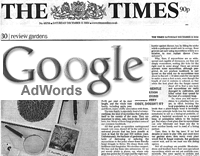 Google is set to announce a new advertising partnership with over 50 American newspapers, in an initiative designed to create an online marketplace to help Ye Olde Printe Media sell advertising electronically.
Google is set to announce a new advertising partnership with over 50 American newspapers, in an initiative designed to create an online marketplace to help Ye Olde Printe Media sell advertising electronically.
Big newspapers like The New York Times, the Chicago Tribune and The Washington Post are already onboard for the trial, with Google planning to expand the service internationally.
Under the scheme, Google will offer some of its AdWords customers the opportunity to advertise in print newspapers in much the same way as they buy advertising on the web.
Newspapers signed up to the scheme enter demographic details about their titles and give example advertising rates, while advertisers list how much they’re prepared to pay for classified space in specified titles.
Publishers then decide whether to accept the offers.
 Launching as an early “alpha” trial, Google has said that it won’t initially charge for hosting the service, but expects to levy a ‘relatively modest commission’ if it takes off.
Launching as an early “alpha” trial, Google has said that it won’t initially charge for hosting the service, but expects to levy a ‘relatively modest commission’ if it takes off.
Runaway success
Google online AdWords campaign has been so successful that they’ve been able to keep up with the demand from advertisers, with Tom Phillips, Google’s director of print advertising, commenting about the print service: “This is money that our advertisers would spend with us if we had the online inventory for them to spend it on.”
Philips added that Google wanted to help the newspaper business, but was still chasing the dollar, “We are not just doing this to be friends with print media. We are doing this because there is a big business opportunity here providing value to media properties,” he added.
 Google’s turbo-charged revenue increases (up 70 per cent in the third quarter) continue to give traditional media outlets the heebie-jeebies, as advertising revenues continue to crash in tabloid and regional titles across the UK.
Google’s turbo-charged revenue increases (up 70 per cent in the third quarter) continue to give traditional media outlets the heebie-jeebies, as advertising revenues continue to crash in tabloid and regional titles across the UK.
Last week, research revealed that Google is now coining in more cash from advertising than Channel 4 in Britain, with the Internet Advertising Bureau saying that online ad spending in the UK had soared 40% in the first half of 2006 compared with the same time period last year.
 If ever you were in any doubt of the painfully high price of printer ink, a feature on tech website Gizmodo shows a graph representing the relative values of various liquids compared to blood.
If ever you were in any doubt of the painfully high price of printer ink, a feature on tech website Gizmodo shows a graph representing the relative values of various liquids compared to blood.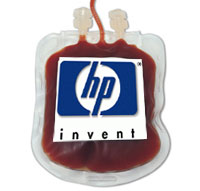 Penicillin comes in at around $0.6/ml, followed by vodka at $0.2/ml, bottled water at $0.1/ml and finally crude oil at something like $0.05/ml (it’s hard to be precise because the graph doesn’t come with a text breakdown).
Penicillin comes in at around $0.6/ml, followed by vodka at $0.2/ml, bottled water at $0.1/ml and finally crude oil at something like $0.05/ml (it’s hard to be precise because the graph doesn’t come with a text breakdown).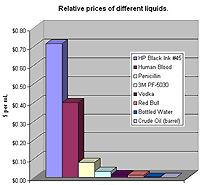 Punters have long complained about the outrageously high cost of printer ink – a 2003 study by the Consumer Association’s Which? Magazine found out that the humble smudgy stuff was priced
Punters have long complained about the outrageously high cost of printer ink – a 2003 study by the Consumer Association’s Which? Magazine found out that the humble smudgy stuff was priced  Britain’s Information Commissioner has published a study concluding that, within 10 years, surveillance of people living in the UK will be all-pervasive.
Britain’s Information Commissioner has published a study concluding that, within 10 years, surveillance of people living in the UK will be all-pervasive. He added: “As ever-more information is collected, shared and used, it intrudes into our private space and leads to decisions which directly influence people’s lives.
He added: “As ever-more information is collected, shared and used, it intrudes into our private space and leads to decisions which directly influence people’s lives. UK sports minister, Richard Caborn, has said that Britain would not protect online gaming executives from extradition requests if they took Internet bets from countries in which they were illegal. These won’t be welcome words to the people running the gambling companies, who have already taken a hit with the arrest of two execs in the US earlier this year.
UK sports minister, Richard Caborn, has said that Britain would not protect online gaming executives from extradition requests if they took Internet bets from countries in which they were illegal. These won’t be welcome words to the people running the gambling companies, who have already taken a hit with the arrest of two execs in the US earlier this year.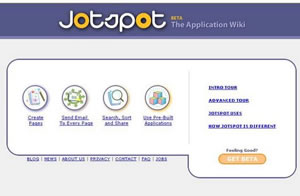 Google has bought Palo Alto, CA-based Wiki/collaborative working company, JotSpot for an undisclosed amount.
Google has bought Palo Alto, CA-based Wiki/collaborative working company, JotSpot for an undisclosed amount. With the release of
With the release of 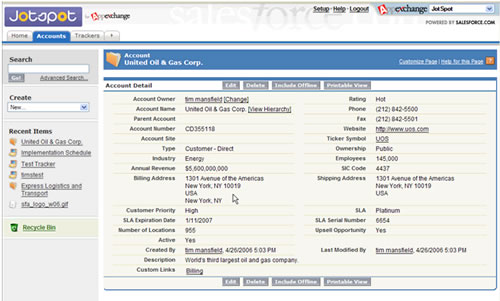
 Microsoft have finally woken up to the fact that people aren’t using their Web server product, Internet Information Server.
Microsoft have finally woken up to the fact that people aren’t using their Web server product, Internet Information Server. Microsoft will be excited with the comments of Andi Gutmans, co-founder and chief technology officer at Zend, “Since our preliminary work with Microsoft, we have already seen a better than 100 percent performance gain with some PHP applications on Windows Server 2003.” Good start.
Microsoft will be excited with the comments of Andi Gutmans, co-founder and chief technology officer at Zend, “Since our preliminary work with Microsoft, we have already seen a better than 100 percent performance gain with some PHP applications on Windows Server 2003.” Good start. The influential UK thinktank, Institute for Public Policy Research (ippr), announced on Sunday that they thought that UK copyright law should be updated to include a “private right to copy,” clause to legalising the personal copying of CDs to portable music players. They also recommend that there should be no extension to the current 50-years copyright term.
The influential UK thinktank, Institute for Public Policy Research (ippr), announced on Sunday that they thought that UK copyright law should be updated to include a “private right to copy,” clause to legalising the personal copying of CDs to portable music players. They also recommend that there should be no extension to the current 50-years copyright term. Steve Wozniak, Apple co-founder and genius hardware builder, is currently on a book tour around the UK promoting …. not surprisingly, his book, iWoz. As you probably know, he’s commonly referred to as Woz.
Steve Wozniak, Apple co-founder and genius hardware builder, is currently on a book tour around the UK promoting …. not surprisingly, his book, iWoz. As you probably know, he’s commonly referred to as Woz. On the iPod and its expected longevity, Woz pins it, “Will the iPod always remain that large? Walkmans seemed to come and then go away. I think Apple’s making the most out of the lifespan.”
On the iPod and its expected longevity, Woz pins it, “Will the iPod always remain that large? Walkmans seemed to come and then go away. I think Apple’s making the most out of the lifespan.” Video howto site VideoJug has signed a deal with UK tabloid, The Sun, to provide ten video clips to them weekly.
Video howto site VideoJug has signed a deal with UK tabloid, The Sun, to provide ten video clips to them weekly. Much of the production of the video is carried out in Spain where they aim to produce up to 500 clips per month. They are also soliciting members of the public to upload their videos to add to the pile.
Much of the production of the video is carried out in Spain where they aim to produce up to 500 clips per month. They are also soliciting members of the public to upload their videos to add to the pile. Odeo, the audio blogging company formed by Evan Williams of Blogger fame, has been bought by one of its founders, Evan Williams.
Odeo, the audio blogging company formed by Evan Williams of Blogger fame, has been bought by one of its founders, Evan Williams.